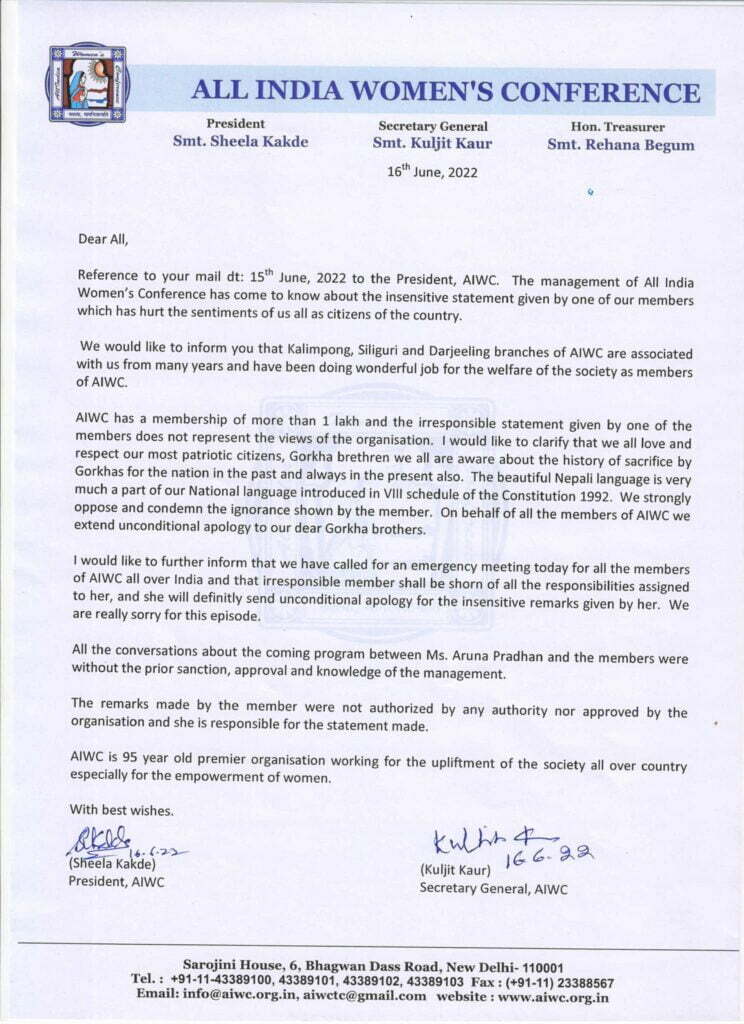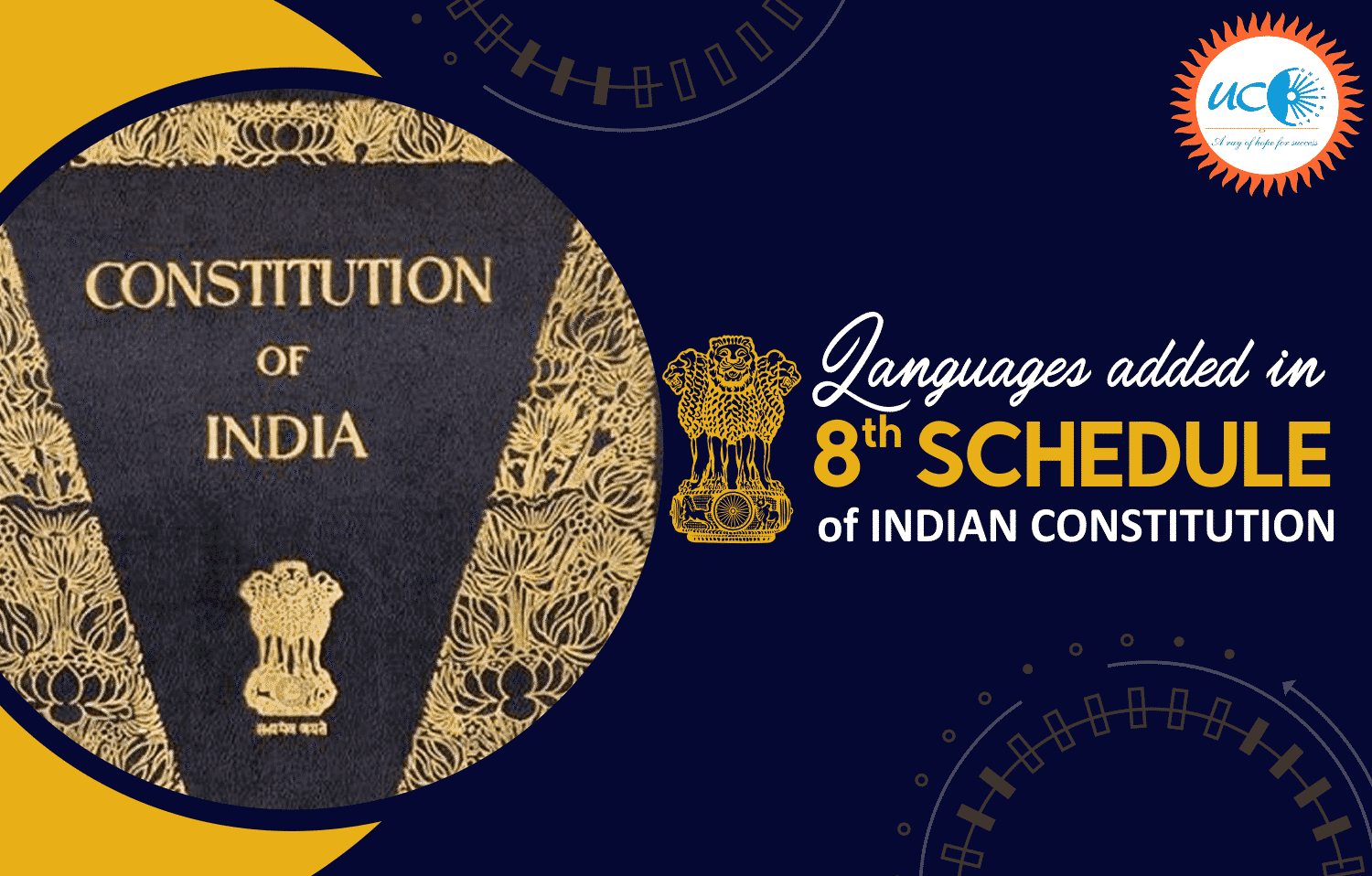Nepali-speaking communities all over India responds to the recent controversy outraged out of not allowing to Nepali artists to perform in an event organized by All-India Women Conference (AIWC) to be held on August 15 this year. AIWC refused to allow performance of Nepali song, saying that the ‘Nepali’ is a “non-Indian” language and suggested sending Assamese song instead.
‘Yo Desh Mero Desh’ song composed by Safal Thapa was sent for participation in All-India Women Conference (AIWC) programme for ‘Azadi ka Amrit Mahotsav’
Speaking with Sikkim Chronicle, “Shenashri Thapa singer of the song Yo Desh Mero Desh said,“ We are very disappointed as citizen of India for labelling our Nepali language as foreign language. Nepali language getting recognition is not recent news, this is heights of ignorance.”
“Chandra Prabha, Executive Member of AIWC in conversation with my mother said to send the song video in Assamese language rather than in Nepali. And when my mother responded stating that we do not speak Assamese and the particular Nepali song was composed by my father in which Mrs Panday, retaliated that Nepali is “foreign language” and not of India” she added
AIWC’s Kalimpong secretary Aruna Pradhan tried to reason with Chandra Prabha Pandey on the issue in which Panday stated, “We don’t want any controversy in future since Nepali is not the language of India, but its national language of Nepal, so we cannot allow the participation. Instead, you can send us participation from any other dialect from northeastern state that would be better”
After the course of event, Nepali-speaking communities of India, particularly from Darjeeling Hills and Sikkim outraged an anger. Dil Kumari Bhandari, former MP Lok Sabha who played a pivtol role in the recognition of Nepali language under the eighth schedule stated, ” To say I am infuriated is an understatement. I am still attempting to process the voice message forwarded to me. The conversation between the AIWC President and Smt Pradhan is highly damaging on several accounts. Firstly, we have highly ignorant people like Smt Kakde functioning as a President of an organization like the AIWC which seeks to bring about equality, all the while totally unaware of her own discriminatory views towards the 1.5 crore Nepalis of India. The Nepali language was included in the Eight Schedule of the Indian Constitution in 1992. Thirty some years later we continue to face discrimination. Secondly, I am disappointed in Smt Pradhan’s response to Kakde’s comment about Nepali not being an Indian language. Why are we apologizing for someone else’s ignorance? Smt Pradhan could have educated the oblivious President on Nepali’s status as granted by the Indian Constitution.”
“My inbox is flooded with request for a response to this incident and people have forwarded their individual responses to me. I do not believe my individual response is the answer. If there ever was a time for all Nepalis to stand together, individuals and all Nepali groups/committees, this is the time. I would like to bring everyone to the table, as one body, and prepare a structured, robust response. I have read Mr. Raju Bista, Hon’ble Member of Parliament’s letter to the AIWC President and commend him for his effort but this incident calls for a substantial response from our entire community. We, the Nepalis of India, have to speak with one voice. Individual, fractured responses only serve to water down this burning issue, an issue which is more than one woman’s ignorance. It is a systemic one, which affects our entire community. An issue that will continue to remain one if we do not deal with it deftly.”
“Our community struggled for over four decades to get our language in the Eighth Schedule of the Constitution. After prolonged debate, and countless working hours in the Lok Sabha, my Private Members Bill received the nod of the House. Most people are probably not aware of the stiff opposition I faced during this time. Divisive forces whose interest was to keep our community divided, and ensure our demand was not met, stated, “Nepali is a bideshi language” in the House. That hurtful statement made thirty years ago continues to be repeated to this day. This Kakde incident might seem small to most but it really is not. Nor is it an innocent comment. It is beyond willful ignorance. It belittles our community’s struggle and questions our very identity as Indians. I urge our people to be vigilant against such forces as it continues to raise its ugly head in various guise to keep us marginalized and divided.” She concluded
Raju Bista, Darjeeling MP for Lok Shaba on Chandra Prabha Pandey statement said, “By claiming that Nepali is not an Indian language, and not allowing performances in Nepali language, that too for ‘Azadi ka Amrit Mahotsav’ celebrations, the AIWC has shown deliberate racism against the Gorkha community of our Nation. Perhaps, the AIWC members are unaware that our Gorkha ancestors have played a vital role in ensuring India’s independence,” he added.
Former Chief Minister of Sikkim, Pawan Kumar Chamling also responded to the incident and claimed the remark of Chandra Prabha Pandey to be ‘offensive, racist and un-Indian’, “The shocking remark of Ms Chandra Prabha, Executive Member of AIWC is extremely offensive, racist and un-Indian and therefore highly condemnable. How can a person holding such responsible position in an organization that represents pan-India aspiration be so ignorant about her own country’s history and diversity? Apart from her ignorance, how can one so patronizingly blurt out such racially objectionable remarks against a community despite the fact that Ms Aruna Pradhan from Kalimpong was trying to remind her that Gorkhas are very many Indian citizens and their language, an Indian language. To say that including a Nepali patriotic song in Azadi Ka Amrit Mahatsav is not possible is among the most unfortunate statements ever meted out to one of the most patriotic Indian communities, namely Gorkha or Indian Nepali.
“I would like to attract the attention of the Indian media in general to take note of what such ignorant fellow Indians have been doing to the Indian Nepalis and flag the issue for nation-wide consideration. Such shameless repetition of racist remarks against us crossed the limit a long time ago, and it is highly likely that it will continue if stringent action is not taken against those who take the matter so lightly.” He added
“I request the AIWC to intervene and tender an apology to the Indian Nepali community as soon as possible. I do not feel the need to enumerate the huge contributions Indian Nepalis and Nepali speakers have been making to the great nation of India since before Independence. The Indian Nepalis deserve respect not because of our contributions (which are massive) but because of our constitutional recognition as Indian. We deserve no less recognition as Indians than any other citizen of our nation.” he concluded
Speaking with national daily newspaper, Ramesh Bastola, the general secretary of the Bharatiya Gorkha Yuva Parisangh said “It is shocking that an esteemed organization like the AIWC has members who seem to be absolutely ignorant that Nepali/Gorkha is spoken by the 10.5 million Indian Gorkhas, duly recognized as an Indian language under the Eighth Schedule of the Constitution of India,”
In an emergent meeting of its core committee held virtually on June 15, the Parisangh decided to take up the issue legally if Ms. Pandey did apologize in the public domain within 24 hours of publication of its statement and in person in the next AIWC meeting.
“Our team will also parallelly file online petition so that this incident doesn’t happen again. We had taken up the matter of an Amazon Prime Video web series where a Nepali language-speaking Gorkha character was shown in a poor light and derogatory remarks were made for the community in the northeast,” Bastola said.

Following the process, The Ministry of Information and Broadcasting had later issued a guideline based on the Parisang’s objection for censoring contents on OTT platforms.
The Parisangh said many people had a misconception that the Gorkhas in India are foreigners and have migrated from Nepal. “The Gorkhas, a product of Indo-Aryan and Mongoloid assimilation, are aborigines of India, and they can trace their history back to not less than 1,000 years in Assam and elsewhere in India,”.
Nepali is listed in the 14 languages in the 8th schedule of the constitution of India, and it is the native language for a large number of people in the country. Nepali speaking Gorkhas are concentrated in North Bengal, while large numbers of Nepali-speaking people live in Uttarakhand, Sikkim, Assam, Arunachal and other northeastern states.
All India Women’s Conference issued a letter condemning the statement of Chandra Prabha, Executive Member of AIWC, “I would like to clarify that we all love and respect our most patriotic citizens, Gorkha brethren we all are aware about the history of sacrifice by Gorkhas for the nation in the past and always in the present also. The beautiful Nepali language is very much a part of our National language, introduced in VIII schedule of the Constitution 1992. We strongly oppose and condemn the ignorance shown by the member. On behalf of all the members of AIWC we extend unconditional apology to our dear Gorkha brothers.”

“I would like to further inform that we have called for an emergency meeting today for all the members of AIWC all over India and that irresponsible member shall be shorn of all the responsibilities assigned to her, and she will definitely send unconditional apology for the insensitive remarks given by her. We are really sorry for this episode.” reads the letter
Furthermore, AIWC held Chandra Prabha Panday responsible for the statement in which AIWC writes “All the conversations about the coming program between Ms. Aruna Pradhan and the members were without the prior sanction, approval and knowledge of the management. The remarks made by the member were not authorized by any authority nor approved by the organization, and she is responsible for the statement made. AIWC is 95 years old premier organization working for the upliftment of the society all over country, especially for the empowerment of women.”

